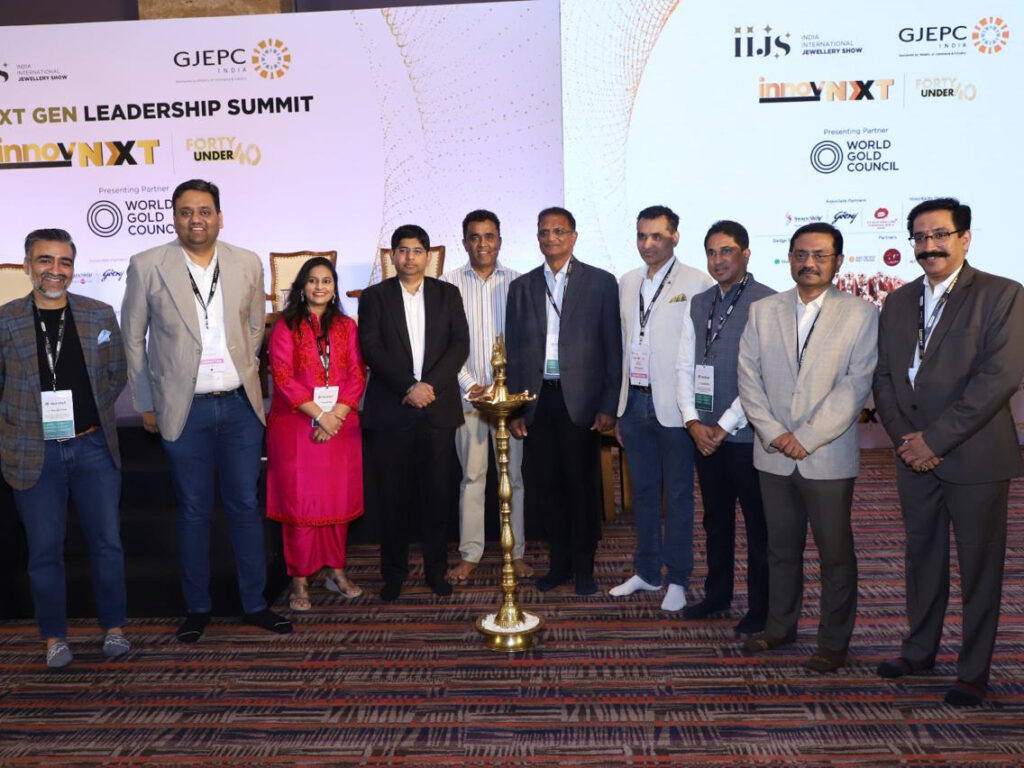INDIA’S DIAMOND JEWELLERY MARKET TO GROW TO US$ 17 BN BY 2031: SAYS DE BEERS AT GJEPC’S INNOVNXT, FORTY UNDER 40 LEADERSHIP SUMMIT
3rd May 2024
Indian diamond jewellery market will grow to US$ 17 bn by 2031 out of India’s total gem & jewellery of US$ 120 bn from $ 79 bn in 2021. 2024 is likely to be a record year for gold mine production and jewellery demand will be firm but vulnerable to gold prices. These interesting nuggets were revealed through several compelling sessions at InnovNXT, Forty Under 40, a next generation leadership Summit, an IIJS Initiative organized by the GJEPC (the apex body for gem and jewellery trade in India)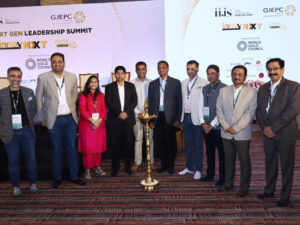
The art of storytelling, symbolism & creative narratives in designer jewellery creations is a must learn for jewellers to take consumers away from price and value towards ‘priceless and invaluable’. Jewellery trade can embrace customer-centric digital to achieve rapid scale and deeper penetration. Jewellers can tap WhatsApp’s potential for growing, engaging, retaining, and monetising customers in 2024. Today GenZ and Millennials don’t trust advertising and can only be tapped via Branded Content strategies. These key aspects were discussed & deliberated during the day-long sessions of InnovNext, Forty Under 40 leadership Summit.
InnovNXT, Forty Under 40 leadership Summit had a full-day knowledge-sharing session comprising learning; igniting innovation, embracing change; and shaping the future. GJEPC curated an exciting line up of speakers and topics that challenged new thinking; sparked new ideas; and inspired action. World Gold Council was the presenting partner for this extraordinary event. Associate Partners are Swarn Shilp, Godrej, and S K Seth Jewellers. Hospitality Partner was ChainNChains. Badge Partner – Quick Sell. Partners – IDT, Mukti Gold, Sky Gold, Shine Shilpi and Unique Chains.
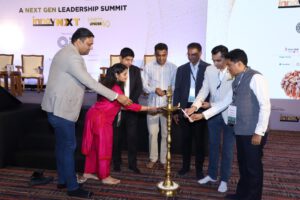
The unveiling of InnovNXT Forty Under 40 commenced on a grand note in the gracious presence of Shri Vipul Shah, Chairman of GJEPC, Shri Nirav Bhansali, Convener of National Exhibitions at GJEPC, Sabyasachi Ray, Executive Director of GJEPC, Shri Ghanshyam Dholakia, Managing Director, Hari Krishna Exports Pvt Ltd, and Members of National Exhibition Subcommittee.
All the sessions were moderated by fellow 40 Under 40 achievers such as Khusbhoo Ranawat, Swarnshilp Jewellers; Shivangi Surana of Surraya Jewels; Karan Garodia of Sanskriti Jewels; Ankit Birawat of Chain n Chains; Ridhi Gala of Kashi Jewellers; Anand Ranawat of Dhanrupji Devaji & Co; Ankit Shah of Ankit Gems.
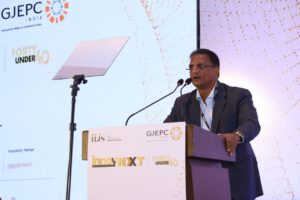
Speaking at the inaugural, Vipul Shah, Chairman, GJEPC, said, “GJEPC’s InnovNXT Forty Under 40, a next Generation leadership summit, is aimed at shaping the future of our industry. This initiative is not just about recognition; it is about nurturing talent, fostering collaboration, and creating opportunities for growth. It’s about ensuring that the industry continues to thrive and evolve, and that our future leaders are equipped with the knowledge and skills they need to succeed. Our aim is to achieve USD 75 billion by 2030 and with the talent, drive, and determination I see the youngsters here today, I am confident that we can not only meet but exceed this goal. Your energy, enthusiasm, and passion are what drives our industry forward. Together, let’s innovate, let’s collaborate, and let’s shape the future of our industry.”
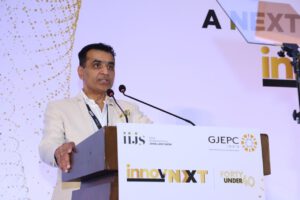
Nirav Bhansali, Convener of National Exhibitions at GJEPC, said, “In the gems and jewellery industry, we are not merely purveyors of luxury; we are guardians of tradition, custodians of culture, and champions of craftsmanship. But in order to honor our rich heritage, we must also embrace the winds of change. Today, we are surrounded by the brightest minds and the most promising talents of our industry. This gathering is not just a celebration of achievements; it is a testament to the boundless potential that resides within each and every one of you. We see the architects of our industry’s future. You are the innovators, the trailblazers, and the visionaries who will shape the landscape of gems and jewellery for generations to come. Your energy, your passion, and your commitment to excellence serve as beacon of hope and inspiration in an ever-evolving world. Through collaboration, not competition, we will truly unlock the full potential of our industry.”
Milan Chokshi, Convener, Promotions & Marketing, GJEPC, and Founder of a couture jewellery brand Moksh, said, “The idea of story-telling is not new to Indian jewellery – our jewels have always been imbued with symbolic values, meaning and narratives. They have just looked much more traditional in design. Now with the rise of design-led jewellers, story-telling is being pushed into a new realm. The beauty of jewellery as a whole is that any interesting piece / design will end up being a conversation starter. The storytelling of a single piece of jewellery is not just in the inspiration or reverence of a piece from the designer, but the personal story and personal meanings the owner has with it.”
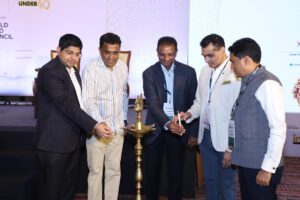
In the session on Global & India Gold Demand Trends, Kavita Chacko, the Research Head for India at the World Gold Council (WGC), said, “2024 is likely to be a record year for mine production of gold; Jewellery demand in 2024 will be firm but vulnerable to gold prices. Bar and coin investment likely to remain healthy, with high prices and geopolitics attracting attention. Central banks are likely to keep buying gold at an impressive rate. Global annual jewellery demand held steady in 2023 at around 2200 tonnes even in a very high price environment. In 2023 Gold has benefitted from a) Heighted geo-political risk; b) Consumer demand; and c) Central bank buying. Annual Gold demand in 2023 rose 4%, reaching an all-time high of 4,930 tonnes. Contribution of 2 sectors a) jewellery demand and b) central bank demand. The demand for jewellery surprised with its stability and resilience and that of central banks by its size.”
In the session on Diamond Consumption Patterns in India, Amit Pratihari, Vice President, De Beers Forevermark, said, “Indian diamond jewellery market will grow to US$ 17 bn by 2031 out of India’s total gem & jewellery of US$ 120 bn from $ 79 bn in 2021. Global jewellery brands are now using Indian celebrity faces to reach out to Indian consumers. The key market drivers in 2024 will be 13% of Indian customers surveyed desire diamond jewellery as a gift, as per Amit. 51% wear diamond jewellery everyday. 12% want to self-purchase jewellery with natural diamonds. 23% acquire natural diamonds to celebrate relationship milestone or to express love. 12% want to self-purchase jewellery with natural diamonds. 22% want to acquire natural diamonds to celebrate personal milestone or to be ready. The Indian luxury market in India will grow to 500 mn in 2030 from 400 mn in 2022, predicted Amit. The increase is expected to be driven by around 20% increase of the middle and high income consumers from 2022 to 2030.”
In the session on The Magic of UPI: India’s Digital Payment Revolution, Dilip Asbe, MD & CEO, NPCI, said, Travelling Indians can do UPI cross-border transactions in neighbouring countries at present and this number will increase by 2025. NPCI is doing 14 billion transactions amounting to Rs. 20 lakh crore in India as of March 2024. 1000 crore such requests are made by our systems on a daily basis. We expect 10x growth from here onwards. Investments of US$ 1-2 billion will be required both on the consumer side and merchants. This is to include the merchants who have not yet joined the ecosystem. Cash is like a religion in India. Cash affinity is still very high. We need to get younger generation in the family to transact on UPI so that s/he can get the elders and seniors. We need to educate and create awareness for consumers. By March 2025 we are hoping that Indians will be able to do cross border transactions in 7 to 11 countries including Nepal, Sri Lanka, Bangladesh Bhutan, Singapore, UAE, Thailand, etc. More of the work on the merchant side is being done. We are also working with European countries.”
In the session on The MSwipe Story: From Doctor To Fintech Titan, Manish Patel, Founder & CEO, MSwipe Technologies, said, “We have brought digital payments to the doorsteps of small and mid-sized jewellery businesses. We run, manage and grow their businesses. We are one of the few compliant players in payments and lending with a broad product portfolio. Our compliance come from Leadership and Governance because we need to win the trust of MSMEs and start-ups. We are problem-solvers to retailers and B2B players. We partner with India’s largest banks on the distribution side. We are now incorporating AI in workflows and codes so seamlessly integrate all diverse and complex aspects into the business operations flow and customer relationship management.”
Speaking about his learnings from the Success Story of CaratLane, Mithun Sacheti, Director, Jaipur Gems, said, “Scale is what drives goals and ambition drives the future. Pure digital for jewellery doesn’t work here as customers have an inherent tactile need. Jewellery trade has not moved online except diamond certification. Jewellers are in the commodity business and customers are not willing to pay them premium for designer jewellery. I would like to partner with jewellers who would like to make timeless masterpieces representing the timeless creativity of the past. Think about creating beautiful jewellery with different new raw materials. Marry your craft and try to make something extraordinary for which the customer will call and pay you more for it.”
Milan Chokshi moderated the session on The Art Of Storytelling Through Jewellery: Narratives, Symbolism, & Meaning, featuring Rahul Jhaveri, Co-founder and Creative Director of Studio Renn; Shachee Shah of Shachee Creations; and Kunal Shah, Jewellery Designer, MOI Fine Jewellery.
Milan Chokshi emphasized, “Make in India, Design in India, Create in India campaign should be all about ‘Come and Discover Indian jewellery’ and its intricacy, vastness and diversity of India in addition to its heritage, cultural values and tradition. Only then will global consumers show willingness to pay premiums for Indian designer jewellery.”
Rahul Jhaveri, Co-founder and Creative Director of Studio Renn, said, “Symbolism in jewellery is about culture and our cultural beliefs — our beliefs that we resonate and relate to. While gold and diamonds are the key raw materials, the use of new ones should be purposeful and meaningful. Only those who intrinsically believe that that jewellery is a form of art are able convey their story to customers. Designers are like architects and musicians – they have inbuilt creative consciousness. The How/Who/Which/Where/When of the creative process is interesting but cannot be communicated or revealed entirely. The biggest challenge for Indian designers is not to overshare their creative process. It will be very difficult to explain how creative work process flows, which is mostly instinctive. Once we follow our instincts the conversion is easy. We are pleasantly surprised by how consumers are open to selecting something new and different and align our learnings to this. Create a world of your own and allow consumers to come in and experience this new world so that they can take away the key elements from this.”
Designer virtuoso Shachee Shah of Shachee Creations said, “Emotions are very important. Craftsmanship is very important and there is need to innovate and revive it. Only knowledge of consumer mindsets can help you innovate. I believe that I visualize my pieces from my heart and transfer my energy to the piece and the customer resonates it. And that’s where the common grounds are! It took me hours of preparation and practice to make my team understand what’s going on in the minds of consumer. It’s not only value of the piece but it’s also about intricate work of art. There are hundreds of moving parts and micro islands of thought process which congregate and translate personal experiences into work of art.”
Kunal Shah Jewellery Designer, Moi Fine Jewellery said, “Consumers are open and inquisitive and they have that special look when they see a new different design. Designing jewellery has to be customer-centric. For example, America has museums that collect Mughal jewellery pieces designed and created in India. We cannot take an abstract creative and add larger narrative around it. In the digital-first business model, customers have trust issues; only good creative designs can help build bridges.”
During the session on ‘Navigating Brand Identity In The Digital Age: Strategies For Building And Sustaining Authentic Brand Presence’, Ashiish Patil, Chief Storyteller, CEO & Co-founder of Isspeshal StratCon, said, “Today, nobody especially millennials and GenZ cares about or trust advertising. It’s risky to only depend on advertising for creating and communicating brand identity in this digital age. Embrace branded content strategies for building and sustaining authentic brand presence. Branded Content is the only way to use Entertainment to inspire and educate target audience; convert strangers into fans; and customers to advocate through consistent storytelling true to the brand across formats, platforms and genres. Branded content doesn’t disrupt or interrupt. It is the only Advertising that people search for… and it is advertising that earns its own media. Branded content is love child of entertainment and advertising. It is birthed and adopted by a brand to take its family name forward. It is content created with funded partially or fully by a brand. Branded content should be Relatable, Fresh, Conflict, Simple, Real, Timely, Cumulative and have Purpose. Branded content can be amplified across audio, video, print, OOH (Ouf of Home), Live, Place, Platform and Digital. The benefits of surround amplification can be many: Extend Life of the Brand; Aid Discovery wrt Customers; Build Bond; get Cheaper Incremental; Potential Revenue, etc.”
Shivam Mittal Co-founder of QuickSell and DoubleTick, a WhatsApp Marketing specialist, said, “Jewellers can embrace integrated suite for WhatsApp-First jewellery business with Timer based private catalogues. They can opt for Curated Catalogue and Gram based B2B order booking. They have an option of Button Rate based B2C booking and can develop E-Commerce strategies including Bulk WhatsApp Broadcasts. We helped PD Soni Jewellers, gold wholesaler from Ahmedabad, to grow by 100% to 650+ cities. We have a Solutions, keeping in mind the needs of the jewellery industry and overcoming all limitations of WhatsApp. Our solution has low talent requirement; is simple and easy to use as well as can be Used on the Go.”
In the session on The Pharmeasy Story: Triumph over Adversity, Siddharth Shah, the Co-founder, Managing Director and CEO of API Holdings Ltd. (Pharmeasy) said, “Adversity and failure is part and parcel of every success story of every entrepreneur. We, at Pharmeasy, faced several adversities but we realised the power of family and friends who believe in you and your business idea help you to tide over the same. The employee team that sticks with you despite all odds is also our greatest asset. The Power of people who believe in you is far higher if you have conviction and self belief in your business model. This power and the support of family, friends and employees/team can take you a long way.”
The Forty Under 40 was introduced at IIJS Premiere 2023 for the first time. It recognised the sharpest young minds in the industry, who have not only showcased outstanding skills but also brought innovation and dedication to the field of jewellery.
About The Gem and Jewellery Export Promotion Council (GJEPC):
The Gem & Jewellery Export Promotion Council (GJEPC), set up by the Ministry of Commerce, Government of India (GoI) in 1966, is one of several Export Promotion Councils (EPCs) launched by the Indian Government, to boost the country’s export thrust, when India’s post-Independence economy began making forays in the international markets. Since 1998, the GJEPC has been granted autonomous status. The GJEPC is the apex body of the gems & jewellery industry and today represents 10000+ members in the sector. With headquarters in Mumbai, GJEPC has Regional Offices in New Delhi, Kolkata, Chennai, Surat and Jaipur, all of which are major centres for the industry. It thus has a wide reach and is able to have a closer interaction with members to serve them in a direct and more meaningful manner. Over the past decades, GJEPC has emerged as one of the most active EPCs and has continuously strived to both expand its reach and depth in its promotional activities as well as widen and increase services to its members.


